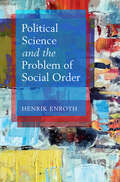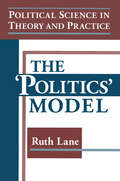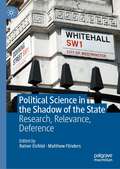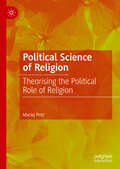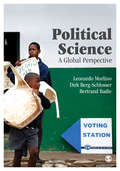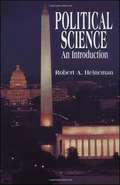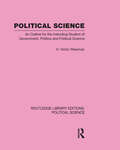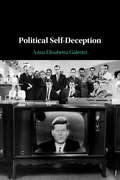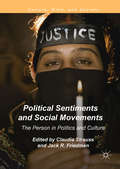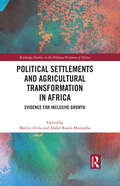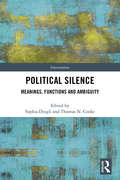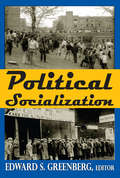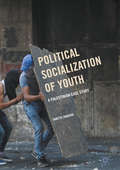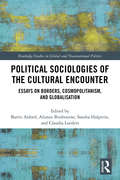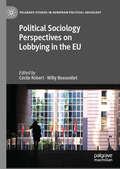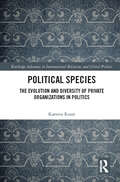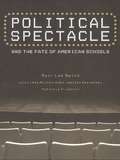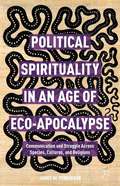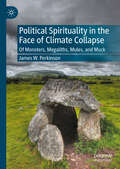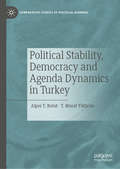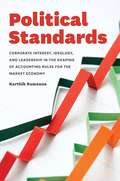- Table View
- List View
Political Science and the Problem of Social Order
by Henrik EnrothThe problem of social order is the question of what holds complex and diverse societies together. Today, this question has become increasingly urgent in the world. Yet our ability to ask and answer the question in a helpful way is constrained by the intellectual legacy through which the question has been handed down to us. In this impressive, erudite study, Henrik Enroth describes and analyzes how the problem of social order has shaped concept formation, theory, and normative arguments in political science. The book covers a broad range of influential thinkers and theories throughout the history of political science, from the early twentieth century onwards. Social order has long been a presupposition for inquiry in political science; now we face the challenge of turning it into an object of inquiry.
Political Science class 10 - Karnataka board: ರಾಜಕೀಯ ವಿಜ್ಞಾನ 10 ನೇ ತರಗತಿ - ಕರ್ನಾಟಕ ಮಂಡಳಿ
by Karnataka Patyapusthaka SanghaPolitical Science text book for 10th Standard kannada medium, karnataka state
Political Science class 11 - Tamil Nadu Board: அரசியல் அறிவியல் மேல்நிலை முதலாம் ஆண்டு
by State Council of Educational Research and Training Tamil Naduஇந்த புத்தகத்தில் நாம் அரசியல் அறிவியலின் அறிமுகம், அரசு, அரசியல் அறிவியலின் அடிப்படைக் கருத்தாக்கங்கள், மக்களாட்சி, அரசாங்கத்தின் வகைப்பாடுகள், அரசியல் சிந்தனை, அரசியல் கொள்கைகள், சமூக நீதி மற்றும் சில பாடங்கள் பற்றி காண்கிறோம்.
Political Science in Theory and Practice: The Politics Model
by Kris E LaneThis text demonstrates that there is a politics model that unifies the discipline and structures its relationship to the other social sciences. It shows how this model underlies important works of applied research in all the main political science subfields.
Political Science in the Shadow of the State: Research, Relevance, Deference
by Matthew Flinders Rainer EisfeldWhat is the link between scholarship and democracy? What role do academics play in sustaining democratic values? Why should concerns about the ‘hollowing-out’ of democracy include a focus on the changing governance of higher education? Offering the first comparative analysis of how both democratic and autocratic politicians are seeking to control the research funding landscape, this book reveals a very worrying shift in the relationships between the state and universities: With higher education politically redefined as a mere tool of economic strategy, the space for academic autonomy, intellectual independence and critical thinking is being closed down. This book will be of interest to anyone concerned about democratic governance and the future of higher education.
Political Science of Religion: Theorising the Political Role of Religion
by Maciej PotzThis book introduces political science of religion – a coherent approach to the study of the political role of religion grounded in political science. In this framework, religion is viewed as a political ideology providing legitimation for power and motivating political attitudes and behaviors of the public. Religious organizations are political actors negotiating the political system in the pursuit of their faith-based objectives. Religion is thus interpreted as a power resource and religious groups as political players. The theoretical framework developed in the first part is applied to the study of theocracies and contemporary democracies, based on the case studies of Poland and the USA. The empirical analysis of resources, strategies and opportunities of religious actors demonstrates their ability to influence the politics of democracies and non-democracies alike. Using a multilevel approach, the book seeks to explain this tremendous political potential of religion.
Political Science: A Global Perspective (The\world Of Political Science)
by Dirk Berg-Schlosser Bertrand Badie Leonardo A. MorlinoFrom the award-winning team behind the International Encyclopaedia of Political Science... Moving beyond mainstream "traditional" approaches to bring you a new advanced-level introduction to political science. A perfect introduction for postgraduates who are new to political science, as well as upper-level undergraduates looking to broaden and deepen their understanding of core topics, this progressive account: Guides you through all key areas of political science: origins, methodological foundations, key topics, and current issues Takes an international and pluralist perspective with all issues explored in a comparative way related to different cultural and historical contexts Includes pulled-out descriptions of major concepts, further reading and self-assessment questions at the end of each chapter.
Political Science: A Global Perspective (The\world Of Political Science)
by Dr Dirk Berg-Schlosser Professor Bertrand Badie Professor Leonardo A. MorlinoFrom the award-winning team behind the International Encyclopaedia of Political Science... Moving beyond mainstream “traditional” approaches to bring you a new advanced-level introduction to political science. A perfect introduction for postgraduates who are new to political science, as well as upper-level undergraduates looking to broaden and deepen their understanding of core topics, this progressive account: Guides you through all key areas of political science: origins, methodological foundations, key topics, and current issues Takes an international and pluralist perspective with all issues explored in a comparative way related to different cultural and historical contexts Includes pulled-out descriptions of major concepts, further reading and self-assessment questions at the end of each chapter.
Political Science: An Introduction
by Robert A. HeinemanIntroductory college textbook on political science
Political Science: An Outline For The Intending Student of Government, Politics and Political Science (Routledge Library Editions: Political Science #14)
by H. Victor WisemanThis book, originally published in 1959, makes explicit the social principles which underlie the procedures and political practice of the modern democratic state. The authors take the view that in the modern welfare state there are problems connected with the nature of law, with concepts like rights, justice, equality, property, punishment, responsibility and liberty and which modern philosophical techniques can illuminate.
Political Self-Deception
by Anna Elisabetta GaleottiSelf-deception, that is the distortion of reality against the available evidence and according to one's wishes, represents a distinctive component in the wide realm of political deception. It has received relatively little attention but is well worth examining for its explanatory and normative dimensions. In this book Elisabetta Galeotti shows how self-deception can explain political occurrences where public deception intertwines with political failure – from bad decisions based on false beliefs, through the self-serving nature of those beliefs, to the deception of the public as a by-product of a leader's self-deception. Her discussion uses close analysis of three well-known case studies: John F. Kennedy and the Cuba Crisis, Lyndon B. Johnson and the Gulf of Tonkin Resolution, and George W. Bush and the Weapons of Mass Destruction. Her book will appeal to a range of readers in political philosophy, political theory, and international relations.
Political Self-Sacrifice
by K. M. FierkeOver the last decade the increasing phenomenon of suicide terrorism has raised questions about how it might be rational for individuals to engage in such acts. This book examines a range of different forms of political self-sacrifice, including hunger strikes, self-burning and non-violent martyrdom, all of which have taken place in resistance to foreign interference. Karin Fierke sets out to study the strategic and emotional dynamics that arise from the image of the suffering body, including political contestation surrounding the identification of the victim as a terrorist or martyr, the meaning of the death as suicide or martyrdom and the extent to which this contributes to the reconstruction of community identity. 'Political Self-Sacrifice' offers a counterpoint to rationalist accounts of international terrorism in terrorist and security studies, and is a novel contribution to the growing literature on the role of emotion and trauma in international politics.
Political Sentiments and Social Movements: The Person In Politics And Culture (Culture, Mind, And Society Ser.)
by Claudia Strauss Jack R. FriedmanThis unique volume is about how ordinary people construct political meanings, form political emotions and identities, and become involved in or disengaged from political contests. Drawing on psychological anthropology, it illustrates the complexities of political subjectivities through engaging personal stories that complicate our understanding of the relationship between culture and politics. Chapters examine the Tea Party and Occupy Wall Street in the United States, third gender activism in India, Rastafari in Jamaica, Courage to Refuse in Israel, the environmental movement in the U.S., Salafi movements in northern Nigeria, post-socialist labor politics in Romania, and anti-immigrant activism in Denmark.
Political Settlements and Agricultural Transformation in Africa: Evidence for Inclusive Growth (Routledge Studies on the Political Economy of Africa)
by Martin Atela Abdul Raufu MustaphaThis book explores the ways in which political settlements can contribute to positive changes in Africa’s agricultural and manufacturing sectors. Contemporary Africa has seen many governments, donors, and commercial private enterprises supporting innovative agricultural and agro-processing schemes with the purpose of diversifying economies. However, many of the schemes collapse or at best fail to generate the needed jobs. Focusing on case studies in Kenya, Nigeria and Ethiopia, this book takes an interdisciplinary approach that combines econometric modelling research, life histories, policy approaches methods, and political economy theory to reframe the field with new questions. The contributors offer alternative explanations for the failure of employment creation schemes in Africa and show how political settlements can bring together stakeholders to settle on win-win approaches to productive employment schemes and inclusive development. Providing new insights on the political economy of agrarian and labour relations in Africa, this book will be of interest to policy actors and development practitioners wishing to support inclusive growth in Africa, as well as to scholars of African politics and economics, public policy and development.
Political Silence: Meanings, Functions and Ambiguity (Interventions)
by Sophia Dingli Thomas N. CookeThe notion of ‘silence’ in Politics and International Relations has come to imply the absence of voice in political life and, as such, tends to be scholastically prescribed as the antithesis of political power and political agency. However, from Emma Gonzáles’s three minutes of silence as part of her address at the March for Our Lives, to Trump’s attempts to silence the investigation into his campaign’s alleged collusion with Russia, along with the continuing revelations articulated by silence-breakers of sexual harassment, it is apparent that there are multiple meanings and functions of political silence – all of which intersect at the nexus of power and agency. Dingli and Cooke present a complex constellation of engagements that challenge the conceptual limitations of established approaches to silence by engaging with diverse, cross-disciplinary analytical perspectives on silence and its political implications in the realms of: environmental politics, diplomacy, digital privacy, radical politics, the politics of piety, commemoration, international organization and international law, among others. Contributors to this edited collection chart their approaches to the relationship between silence, power and agency, thus positing silence as a productive modality of agency. While this collection promotes intellectual and interdisciplinary synergy around critical thinking and research regarding the intersections of silence, power and agency, it is written for scholars in politics, international relations theory, international political theory, critical theory and everything in between.
Political Socialization
by Edward S. GreenbergFocusing on the forces underlying headlines, this volume examines the processes and outcomes of political socialization-the ways in which an individual acquires the attitudes, beliefs, and values of the political culture from the surrounding environment, and takes on a role as citizen within that political framework.Political Socialization vividly points out the contradiction currently existing between the optimism found in the traditional literature of this field and the reality of dramatic present-day incidents. This book offers a selection of papers that advance the recognized approach and set forth the new thinking on the subject. It provides a survey of both sides of this thought-provoking debate and, as such, remains as valid today as when it was first published in 1970.An incisive introduction by the editor defines and outlines the issues and problems involved, and places the various contributions in perspective. Greenberg voices the belief that "a significant number of the young and highly educated are beginning to bring into question the legitimacy of political, social, and economic arrangements" and that the Vietnam War and the civil rights movement were socializing events, playing as powerful a role as did the Depression for the parents of the younger generation. The debate format will provide the reader with a variety of commentary and lead them to form their own judgment on these major historical intellectual disputes.
Political Socialization of Youth
by Janette HabashiThis book increases the awareness of youth political agency and how it relates to adults, governments, communities, and local and global discourse. It reveals the complexity of youth's political lives as it intersects with social identifiers such as location, gender, and political status, and interacts with neoliberal discourse embedded in media, local politics, education, and religious idioms. This book fills a gap in existing research to provide a body of literature on the political socialization and its manifestation in youth political agency. The research findings aid in understanding the abilities of youth to reason, reflect upon, articulate, and act upon their political views. This research is not only pertinent to children in Palestine, but can also be applied to children living everywhere as global discourse of oppression is not limited to a location, age or a group.
Political Sociologies of the Cultural Encounter: Essays on Borders, Cosmopolitanism, and Globalization (Routledge Studies in Global and Transnational Politics)
by Sandra Halperin Barrie Axford Alistair Brisbourne Claudia LuedersThis book offers transdisciplinary scholarship which challenges the agendas of and markers around traditional social scientific fields. It builds on the belief that the study of major issues in the global cultural and political economies benefit from a perspective that rejects the limitations imposed by established boundaries, whether disciplinary, conceptual, symbolic or material. Established and early career academics explore and embrace contemporary political sociology following the ‘global’ and ‘cultural’ turns of recent decades. Categories such as state, civil society, family, migration, citizenship and identity are interrogated and sometimes found to be ill-suited to the task of analyzing global complexities. The limits of global theory, the challenges of global citizenship, and the relationship between globalisation and situated and mobile subjects and objects are all referenced in this book. The book will be of interest to scholars of International Relations, Political Science, Sociology, Political Sociology, Social Theory, Geography, Area studies and European studies.
Political Sociology Perspectives on Lobbying in the EU (Palgrave Studies in European Political Sociology)
by Cécile Robert Willy BeauvalletThis book examines lobbying in the European Union, the practices and social trajectories of interest representatives working in Brussels. Lobbying now occupies a central place in the government of the European Union and is also at the heart of European politics, as shown by the recent Qatargate scandal. The subject of lobbying has a long history in political science, and lobbying the European Union has been the subject of now classic works and specialist journals, testifying to the great success of this subject. However, most of this work have left aside the question of the professional identity, trajectories and social properties of the actors who work on a daily basis in the coproduction of European public action. Indeed, few works have been yet devoted to analysing their concrete practices. Despite the fact that over 12,000 organisations are now on the European Transparency Register, declaring increasing annual lobbying budgets, we still know very little about those who carry out this activity.
Political Species: The Evolution and Diversity of Private Organizations in Politics (ISSN)
by Karsten RonitIn Political Species, Karsten Ronit expertly argues that evolutionary biology can provide important sources of inspiration for analyzing the proliferation of private actors/organizations in domestic and global politics. Focusing on the evolution of a diversity of such private actors/organizations in politics, Ronit emphasizes that individuals are affected by and contribute to societal, cultural, and political evolution through a range of formal organizations and that societies, cultures, and politics influence and build upon values and norms transmitted by individuals via these formal organizations. By being mindful of these contextual factors and keeping in mind the important research done in the micro- and macro-perspectives, we can gain a better understanding of the diversity of private actors/organizations and how they evolve and adapt. Evolutionary biology teaches us that over time, different varieties emerge, specialize, and adapt to the ever-changing conditions in complex environments before accumulating into new species. Much change characterizes these processes of political evolution because actors constantly emerge and add to the existing population of private actors that, in one way or another, are engaged in politics.
Political Spectacle and the Fate of American Schools (Critical Social Thought)
by Mary Lee Smith Linda Miller-Kahn Walter Heinecke Patricia F. JarvisThe authors argue that the most influential and well-known educational policy programs in the past 30 years are not based on democratic consensus, but are instead formulated by the political community as symbolic efforts meant to generate personal partisan gain.
Political Spirituality in an Age of Eco-Apocalypse
by James W. PerkinsonThis book 'hunts and gathers' across different historical epochs and situations, juxtaposing biblical materials and hip-hop, Christian colonialism and vodou, personal experience and racial politics, poetics and high theory. It is compelled by a desire to challenge the current crisis of sustainability from the point of view of indigenous communities and deep ancestry. Author James W. Perkinson ably synthesizes material from a diverse range of fields, including anarcho-primitivism, biblicalstudies, and history of religions in order to argue for a 'turn to indigeneity. ' The book's motive force is a deep concern for humanity's future in the face of eco-disasters like climate change and population overshoot as well as the compounding problems brought on by political economy calamities. Given the growing trend toward a turn away from institutionalized religious commitment and toward a more generalized and post-modern mix of practices and interests typically styled as 'spiritual,' the work proposes 'political spirituality' as a theme for investigation. Throughout the book, Perkinson raises the question: What does it really meant to be a human being? This query is posed not merely as a philosophical inquiry or existential musing, but as a personal and political conundrum arising from the overwhelming crises now engulfing our global reality. The book constitutes a poetic 'walk about' across quite different historical epochs and disparate contexts. Creatively foraging for indigenous memories and insurgent energies to help us live and cope in our modern state of unsustainability, the work aims to re-animate love of the wild and 'interspecies listening' for the sake of survival. The text articulates a deep suspicion toward our growing fascination with a kind of 'techno-messianism,' while nonetheless exploring some of the artistic innovations and meanings emerging from industrialization and digitalization.
Political Spirituality in the Face of Climate Collapse: Of Monsters, Megaliths, Mules, and Muck
by James W. PerkinsonThis book takes its motive force from our contemporary climate crisis. It seeks to reorient human (and especially Christian) understanding, towards a more ecologically-focused, indigenously-informed way-of-living. James W. Perkinson argues that our current eco-climatic and socio-political emergency is the culmination of a 5,000-year history of supremacist “settlement,” in which city-states first emergent in Mesopotamia and Egypt not only begin coercively organizing labor into surplus production and ecosystems into inordinate and destructive yields of “goods,” but in the process, also simultaneously “deform” the Spirit-World “haloing” of natural phenomenon into outsized service of imperial reach. Perkinson recognizes globalized humanity as an emerging monstrosity destroying both human culture and the world. How we re-envision and revalue, at our critical juncture, our inescapable interdependence with the more-than-human world as peer and teacher and even “elder,” is the central theme that throbs below the surface of the very disparate topics commanding attention in each chapter.
Political Stability, Democracy and Agenda Dynamics in Turkey (Comparative Studies of Political Agendas)
by Alper T. Bulut T. Murat YildirimThis book examines the determinants and consequences of policy responsiveness and change, and how policy issues get onto the media and legislative agenda in a transitional democracy. It provides a detailed and attention based theory of Turkish Politics, and develops and introduces comprehensive content-analytics datasets of legislative activities and media coverage that span over several decades.
Political Standards: Corporate Interest, Ideology, and Leadership in the Shaping of Accounting Rules for the Market Economy
by Karthik RamannaPrudent, verifiable, and timely corporate accounting is a bedrock of our modern capitalist system. In recent years, however, the rules that govern corporate accounting have been subtly changed in ways that compromise these core principles, to the detriment of the economy at large. These changes have been driven by the private agendas of certain corporate special interests, aided selectively—and sometimes unwittingly—by arguments from business academia With Political Standards, Karthik Ramanna develops the notion of “thin political markets” to describe a key problem facing technical rule-making in corporate accounting and beyond. When standard-setting boards attempt to regulate the accounting practices of corporations, they must draw on a small pool of qualified experts—but those experts almost always have strong commercial interests in the outcome. Meanwhile, standard setting rarely enjoys much attention from the general public. This absence of accountability, Ramanna argues, allows corporate managers to game the system. In the profit-maximization framework of modern capitalism, the only practicable solution is to reframe managerial norms when participating in thin political markets. Political Standards will be an essential resource for understanding how the rules of the game are set, whom they inevitably favor, and how the process can be changed for a better capitalism.
